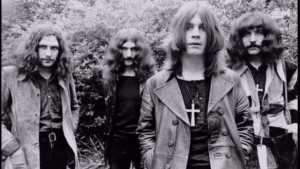Paul Stanley From KISS Reveals His Favorite Guitarist List

Paul Stanley for a Smokey Robinson cover - PaulStanleyVEVO / Youtube
Even the most celebrated musicians draw inspiration from others, and KISS is no exception. In a recent interview with Guitar World, Paul Stanley, KISS’s rhythm guitarist, revealed his 13 favorite guitarists who left a lasting impact on him.
He emphasized the equal importance of rhythm players compared to lead ones, stating, “It’s challenging to tap-dance without music. I’ve always aimed to highlight the significance of a rhythm guitarist.”
During the discussion, the Starchild praised iconic guitarists like Eddie Van Halen and Randy Rhoads as “greats.” However, he expressed his disinterest in certain techniques like tapping and the use of whammy bars, focusing instead on the importance of understanding the roots of musical innovations.
Stanley outlined his criteria for defining a great guitar player and stressed the necessity of depth and a foundational understanding of musical history. In unveiling his top 13 guitarists who inspired him, he highlighted a diverse array of talents, including a trio of unrelated guitarists celebrated for their influence.
‘The Three Kings’ – B.B. King, Freddie King, and Albert King
Referring to the influential trio known as ‘The Three Kings’—B.B. King, Freddie King, and Albert King—Stanley emphasizes the pivotal role these legendary blues guitarists played in shaping his music. Reflecting on the impact of the Kings, he acknowledged the importance of not merely emulating but internalizing their styles, allowing them to become integral aspects of their musical reference and vocabulary.
“It’s not a matter of whether you emulate the players who inspired you; it’s that you ingest what they do and let that become a part of reference and vocabulary. I’ve always thought that if you listen to only one type of music, that one type of music becomes incestuous to what you’re doing, and you won’t bring anything new to what you’re doing,” Stanley said.
Beyond the early influences of Eddie Cochran, The Starchild recounted a phase characterized by folk music, complete with a harmonica adorning their neck. This folk orientation, however, did not exclude a continued appreciation for blues, with a specific mention of Sonny Terry, Brownie McGehee, Junior Wells, and Buddy Guy alongside Albert, Freddie, and B.B. King.
Jimmy Page
In the eyes of Paul Stanley, Led Zeppelin’s Jimmy Page is the epitome of a consummate guitarist, and has likened the latter to Beethoven for his ability to paint with music in an extraordinary and stellar manner.
“And I know there’s a lot of British guitar players that we talk about where people say, ‘Who is better, this guy, or that guy?’ Well, I’ll tell you this – there’s only been one of those players who has been able to spread and work outside of the idea of what he was initially defined as, and that’s Jimmy,” the KISS guitarist acknowledged.
Page, according to Stanley, defies easy classification as purely a rock or metal guitarist; instead, he is described as a true world music artist, encompassing a vast spectrum of musical styles. The appreciation for Page extends beyond technical proficiency; it is rooted in his genuine love for music, evident in every note he plays.
https://twitter.com/juandavidroja17/status/1720898425959395447
Pete Townshend
In Stanley’s perspective, The Who’s outspoken guitarist and leader Pete Townshend is an artist who consistently opts for a departure from flashy solos, instead favoring a chord-driven approach in the majority of his compositions. Regardless of whether these chords involve inversions, Townshend’s musical foundation revolves around chord structures.
Paul continued, “Pete Townshend is someone who clearly prefers most of the time to steer away from flashy solos. All his songs are pretty much chord-driven, whether they’re inversions or not, they’re based on chords.”
Townshend’s musical philosophy, as admired by the Starchild, underscores the importance of being a showman while adhering to the role of a rhythm player without succumbing to the temptation of overplaying. This dual quality, the combination of showmanship and a disciplined approach to rhythm playing, is regarded as a hallmark of Townshend’s artistry.
https://twitter.com/who_gallery/status/1721448254464758058
Richie Havens
The unconventional and unparalleled approach to rhythm playing by renowned folk and blues musician Richie Havens left a profound impact on Stanley. He expressed a sense of awe and admiration, noting that they had not encountered anything quite like Havens’ style before.
“I mentioned him earlier as someone I took notice of, and it’s with good reason. If you want to be a great rhythm player, I urge you to watch Richie Havens. But you really have to listen closely and understand what he’s doing because it’s just so incredible. What Richie Havens was capable of doing with his right hand was downright insane,” Stanley urged.
The experience of discovering Havens’ musicality served as a transformative moment, reshaping Stanley’s understanding of the possibilities inherent in rhythm playing and redefining their expectations for how it should manifest within the structure of a song.
Steve Marriott
In the context of Paul Stanley’s major musical influences, Steve Marriott, particularly during his tenure with Humble Pie, holds a special place in his admiration. Acknowledging Marriott’s significant contribution, the KISS guitarist noted that while he was undoubtedly a commendable lead guitarist, it was his rhythm playing that left an enduring impact—solid, unyielding, and seemingly impervious.
“I saw Steve at the Fillmore as a much younger man, and what I saw had an indelible effect on me as a young guitarist. Humble Pie and Steve’s playing was a big part of what I had in mind when KISS first started,” Stanley revealed.
Marriott’s influence, as described by Starchild, transcended the technical aspects of guitar playing. This guitar player’s role not only as a lead guitarist but as a stalwart in the realm of rhythm playing becomes a testament to his enduring impact on the Stanley’s musical ethos and the trajectory of their own artistic endeavors.
https://twitter.com/denajag/status/1721719316213534911
Malcolm Young
In discussing influential rhythm players, Stanley acknowledged Malcolm Young, noting that although Young entered the scene after them, his impact is noteworthy. Recognized as one of the greatest rhythm players in rock history, Young’s significance is particularly evident in the context of AC/DC’s catalog.
“If you spent any time listening to AC/DC’s music, you’d know that while Angus is an incredible lead player, Malcolm Young is clearly the foundation that allows Angus to do what he does so well,” Paul observed.
Drawing parallels to their own musical approach, Stanley highlighted a similar mentality shared with Malcolm Young. Acknowledging the distinctiveness of KISS compared to AC/DC, he pointed out the importance of understanding the band dynamics. He asserted that, much like AC/DC, the foundation laid by the rhythm guitar is paramount in KISS’s sonic identity.
Jimi Hendrix
“Of course, there’s Jimi Hendrix. I saw Hendrix twice with Mitch Mitchell, and that was like watching something from another planet. It was utterly indefinable,” Stanley gushed about his musical hero.
The KISS guitarist drew a parallel to the dynamic between Hendrix and Mitchell. In particular, he noted the importance of the relationship between a rhythm player and a drummer, underscoring its significance in the overall sonic landscape.
Drawing a connection to their band’s drummer, Eric Singer, the speaker mentions how Eric often follows and observes their lead for musical changes. This insight emphasizes the interconnectedness of rhythm guitar and drums, a synergy as crucial as that between drums and bass—an understanding acquired early in the speaker’s musical development.
Neil Young
Another influential guitarist that Stanley turned his attention to was the folk legend and singer-songwriter Neil Young, a figure perhaps less immediately evident but significant in their estimation. Emphasizing Young’s prowess as an acoustic player, the former KISS guitar player expressed a personal preference for his acoustic style over his electric playing, attributing this distinction to a matter of taste.
“Neil Young has such subtlety in his rhythm playing and his chords. And his picking is just terrific. He’s a truly great guitar player with a lot of nuance that I’ve always been drawn to,” Stanley shared.
Paul admired Young’s picking technique, describing it as terrific and highlighting the nuanced qualities that have consistently drawn them to his playing. In this regard, Neil Young is portrayed as a guitarist of profound depth and subtlety, qualities that transcend the distinction between acoustic and electric playing.
Paul Kossoff
Recalling a moment of profound musical impact, Stanley reflected on the first encounter with the guitar mastery of Paul Kossoff from the band Free. The memory is vividly etched as it unfolded during a car ride, a time when the speaker had recently acquired their driver’s license.
“When I turned the radio on and heard Paul Kossoff playing on [Free’s] “All Right Now”, I had to pull over and catch my breath. His command of chords was deceiving in what appeared he was doing vs. what he was actually doing,” the guitarist recalled.
The speaker marveled at the solo in “All Right Now”, noting that its brilliance lies not only in what Kossoff played but, significantly, in what he chose not to play. This deliberate restraint and the thoughtful use of space in the solo become a defining characteristic, surpassing the allure of overtly powerful or supposedly exquisite solos.
Lindsey Buckingham
As he continued listing down his favorite guitarists, Stanley remembered Fleetwood Mac’s Lindsey Buckingham and exclaimed how he nearly overlooked the remarkable guitarist.
Acknowledging Buckingham’s extraordinary abilities, the speaker marvels at his ability to achieve the seemingly impossible. However, the true brilliance of Buckingham’s playing, according to the speaker, lies in his unique fusion of Travis picking and a distinct, self-fashioned folk style.
“What Lindsey Buckingham does is timeless and genuinely unmistakable, and it made those classic Fleetwood Mac albums very special. I’ve never really heard anything like it or anyone else play the way he does,” Stanley said.
Nancy Wilson
The last on his list, Stanley discussed the prowess of guitarist and half of the female power of the rock band Heart, Nancy Wilson, calling her a “great guitarist”.
Expressing frustration with the notion of placing gender-specific labels on musical ability, Stanley asserted that Wilson’s excellence as a guitarist stands on its own merit, free from any unnecessary qualifiers.
“That woman is a fantastic rhythm player and, again, another fingerpicker. That in and of itself inspires me because I’ve always been drawn to players adept at something rooted in fundamentals and basics,” the KISS guitarist added.











